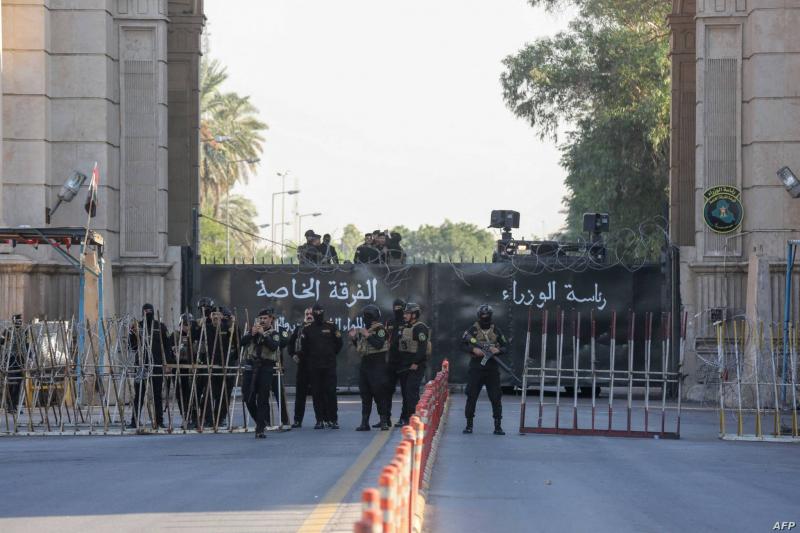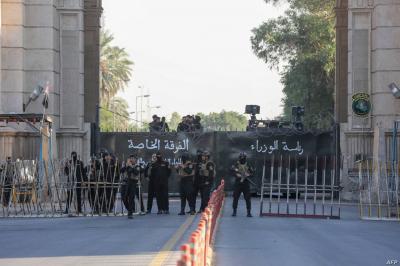Iraq announced on Sunday the opening of an investigation to determine the origin of the drone that was used in the failed assassination attempt on the caretaker Prime Minister, Mustafa Al-Kadhimi. Iraqi President Barham Salih described the act as a "heinous crime" against the country.
The spokesperson for the Commander in Chief of the Armed Forces, Major General Yahya Rasool, stated that "an investigation has been opened to identify the launch site of the explosive-laden drone," noting that security and intelligence agencies have begun collecting evidence, as reported by the Iraqi News Agency (INA). Rasool affirmed that the security situation in the heavily fortified Green Zone in Baghdad is stable and secure, emphasizing that security forces are working to maintain order.
Additionally, the Joint Operations Command stated that it will pursue anyone attempting to undermine state security, confirming that "the security forces are capable of mitigating risks," according to the Iraqi News Agency.
In a tweet, the Iraqi President condemned the terrorist attack targeting the Prime Minister, calling it a serious breach and a heinous crime against Iraq, which requires a unified stance to confront those threatening the country's security and the safety of its people. He stated, "We cannot accept dragging Iraq into chaos and overturning its constitutional system."
In a related context, the head of the Wisdom Movement, Ammar Al-Hakim, condemned the failed assassination attempt, considering it a serious development. Al-Hakim tweeted that targeting the Prime Minister's residence is an act that is condemned and denounced, as it could escalate tensions and jeopardize the state's prestige while damaging Iraq's reputation on the global stage. He added that targeting the head of the highest executive authority in the country represents a serious development that risks the achievements made in security, political, and economic domains.
Al-Kadhimi survived an assassination attempt when an explosive-laden drone targeted his residence in the Green Zone in Baghdad early Sunday, according to official Iraqi sources. A statement from the Security Media Cell said: "The Prime Minister of Iraq was the target of a failed assassination attempt using an explosive-laden drone that tried to hit his residence in the Green Zone in Baghdad without causing him any harm."
The assassination attempt came at a time of severe political tensions in the country following the results of the early parliamentary elections held on October 10, with political blocs representing the Popular Mobilization Forces—an Iran-aligned coalition of armed factions—rejecting the preliminary results showing a decrease in their seats.
Political analyst Ali Al-Baydar noted that the incident was expected due to the rise of armed groups that disregard state institutions. He stated in an interview with Al-Hurra channel that "what these groups have done represents a pivotal stage and must be approached with caution, requiring external intervention to eradicate them as previously happened with ISIS."
Al-Baydar emphasized that this operation should not go unnoticed, urging Iraq to inform the international community of the threat to state sovereignty presented by the attempt to overturn the democratic experience, which calls for a strong response to these unlawful groups. He pointed to the necessity of U.S. intervention to protect the Iraqi democratic experiment, adding that if the United States does not recognize and address the challenges facing this experience, Iraq would head towards dangerous options.
The United States strongly condemned the assassination attempt on Al-Kadhimi when an explosive-laden drone targeted his residence in the Green Zone, deeming this attack a "clear act of terrorism." U.S. State Department spokesperson Ned Price stated, "We were relieved to learn that the Prime Minister was unharmed. This clear terrorist act, which we condemn vehemently, targeted the core of the Iraqi state."
Price added that the United States is in close contact with Iraqi security forces tasked with maintaining Iraq's sovereignty and independence, and noted that Washington had offered assistance in investigating this attack. Al-Baydar referred to the attempt on Al-Kadhimi's life as a "clear signal that we are capable (the armed militias) of reaching the head of state and changing the equation, and it is possible to intimidate everyone," indicating that it serves as a means of pressure and a severe message that everyone should heed, as he described.




